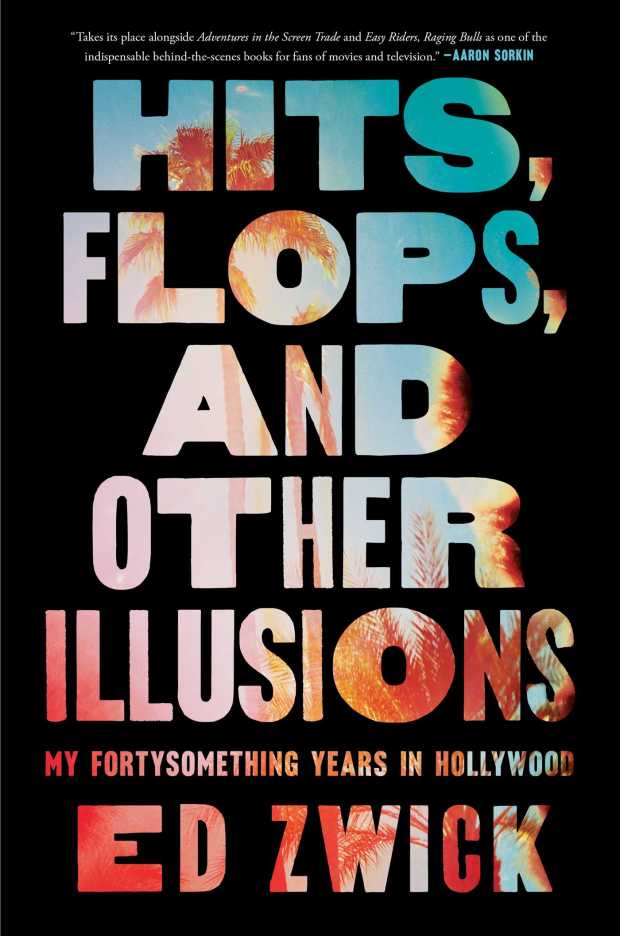On a recent Friday night, Jim Belushi walked into an apartment high above the city and shouted, “Am I late? Did you talk about me yet?”
He had been invited, of course, as had the other 40 or so people who filled the handsome apartment of Christie Hefner, who is the accomplished daughter of Hugh Hefner but, more to this evening’s point, a New Trier High School classmate (1970) of the guest of honor, the film director Ed Zwick, who was in the middle of telling people about his new book, “Hits, Flops, and Other Illusions: My Fortysomething Years in Hollywood.”
So Belushi shouted, some people laughed and Zwick carried on, saying, “Haven’t mentioned you yet, Jim, but I will.”
It had been a busy couple of days for Zwick, visiting from his home in Santa Monica, California. He was the focus of an evening event Thursday at the American Writers Museum, and there was a Friday luncheon gathering at the University Club.
Among the guests at Hefner’s party were a few other New Trier alumni, such notables as Bob Falls and Roche Schulfer of Goodman Theatre renown, actor Mark Marc Grapey, former alderman and newspaper executive Edwin Eisendrath, and Chaz Ebert, the businesswoman and widow of film critic Roger Ebert, who has her own book coming out in April. Also, there were Stuart Oken and Jason Brett, the film producing team behind many projects over the years, whose first encounter with Zwick was the film version of the David Mamet play, “Sexual Perversity in Chicago,” which became “About Last Night” and turned the pair into what Zwick calls “lifelong friends.”
“I remember being with Ed at the Deauville Film Festival where we were showing ‘About Last Night’ and the two of us staying up all night with the director Richard Brooks listening to him tell stories about Hollywood,” he said. (Brooks was known for such films as “Blackboard Jungle,” “Elmer Gantry” and “In Cold Blood.”) “That’s what I felt listening to Ed talk about his book. In person and in print Ed is a master storyteller.”
“About Last Night” was Zwick’s first hit film. He directed, and it starred Rob Lowe, Demi Moore and Jim Belushi who, Zwick writes, “became my great ally, and his performance was brilliant.”
The Belushi stories are among the book’s best, but it is a fine and honest book. Its first line is this: “I tell stories for a living.” True to those words, the book’s 300-some pages are filled with stories, about the making of such television shows as “Thirtysomething” and “My So-Called Life” and nearly two dozen movies, including “Glory,” “Legends of the Fall,” “Shakespeare in Love,” “The Last Samurai,” “Blood Diamond” and “Jack Reacher: Never Go Back.” The stories are filled with enough bold-faced names for a dozen old-fashioned gossip columns: Tom Cruise, Denzel Washington, Brad Pitt, Leonardo DiCaprio, Meg Ryan…and on and on.
“The book was born when COVID came. It shut down the plans for a reimagining of “Thirtysomething” called “Thirtysomething(else)” and during this down time I started looking back at some of the work I’d done,” he said. “I’m not a retrospective kind of person. I am always looking forward. But in watching my movies, I was astonished by the people I had been with, the relationships I had formed.”
His book is a generally sunny trip, in sharp contrast to the recent work by another local lad with Hollywood adventures. That would be David Mamet, whose recently published “Everywhere an Oink Oink,” lives up to its subtitle, “An Embittered, Dyspeptic, and Accurate Report of Forty Years in Hollywood.” As I wrote, “There is a certain anger and disappointment shadowing this book, reflecting what he feels is the ruination of Hollywood.”
Zwick knows and respects Mamet. “We aren’t friends but there is an upcoming Los Angeles book festival and there’s some talk that David and I might be on the same panel,” Zwick says. “I would like that.”
There is no question that Zwick shares some of Mamet’s views about Hollywood and the movie business. His view: “These days, big movies with movie stars and all the bells and whistles tend to be about superheroes and comic books. This isn’t grousing. It is what it is.”
“Hits, Flops, and Other Illusions: My Fortysomething Years in Hollywood” by Ed Zwick. (Gallery Books)
Still he is working on a new film project and is pleased by the reception his book is receiving, praise such as this from The Wall Street Journal: “The author warns early on that he’ll be dropping names, and he certainly does . . . Not everyone is remembered so fondly, but the author on the whole comes off as humble about his success and charmingly self-deprecating. … (A) heartfelt memoir in movies and more.”
The book is punctuated by chapters that offer “tips” and “lessons,” such as “It’s Possible to Make a Bad Movie Out of a Good Script” and “Fall in Love with the Actors: But don’t mistake it as being real. Transfer your fascination with them to the screen. And don’t sleep with them though they are shiny and alluring.”
One thing the book does not provide is much about his personal life. We do learn that he is happily married, has two good kids (both writers) and successfully dealt with a serious health problem, His high school years? Only a bit. His childhood? Not much.
Here is the paragraph that begins Chapter 15: “My paternal grandfather was a tough Jew. I’m named after him; my Hebrew name is Yitzhak. In 1920s Chicago his five brothers (“the Uncles,” as they were known in my family), Dovie, Fat, Zus, Zell, and Jules, were “betting commissioners” (read bookies) for the Capone mob. As a boy I secretly relished my family’s unsavory past.”
Sounds like that might make a good book, yes? What about a movie?
rkogan@chicagotribune.com





